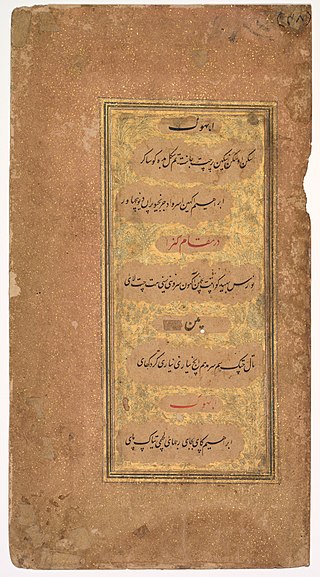
Deccani or Deccani Urdu is a language spoken in the Deccan region of south-central India and the native language of the Deccani people. The historical form of Deccani sparked the development of Urdu literature during the late-Mughal period. Deccani arose as a lingua franca under the Delhi and Bahmani Sultanates, as trade and migration from the north introduced Hindavi to Deccan. It later developed a literary tradition under the patronage of the Deccan Sultanates. Deccani came to influence Hindavi, on which Urdu and Hindi are based.
Indian poetry and Indian literature in general, has a long history dating back to Vedic times. They were written in various Indian languages such as Vedic Sanskrit, Classical Sanskrit, Ancient Meitei, Modern Meitei, Telugu, Tamil, Odia, Maithili, Kannada, Bengali, Assamese, Urdu, and Hindi. Poetry in foreign languages such as English also has a strong influence on Indian poetry. The poetry reflects diverse spiritual traditions within India. In particular, many Indian poets have been inspired by mystical experiences. Poetry is the oldest form of literature and has a rich written and oral tradition.

Rajahmundry, officially Rajamahendravaram, is a city in the Indian state of Andhra Pradesh and district headquarters of East Godavari district. It is the seventh most populated city in the state. During British rule, the district of Rajahmundry was created in the Madras Presidency in 1823. It was reorganised in 1859 and bifurcated into the Godavari and Krishna districts. Rajahmundry was the headquarters of Godavari district, which was further bifurcated into East Godavari and West Godavari districts in 1925. It is administered under Rajahmundry revenue division of the East Godavari district. The city is known for its floriculture, history, culture, agriculture, economy, tourism, and its heritage. It is known as the "Cultural Capital of Andhra Pradesh".
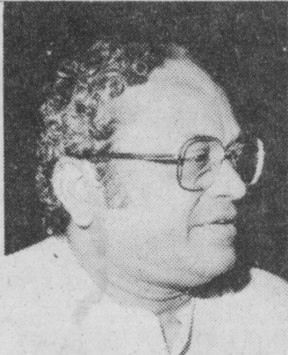
Cingireddi Narayana Reddy, popularly known as CiNaRe, was an Indian Telugu-language poet, writer, and critic. He had produced over eighty literary works including poems, prose-plays, lyrical plays, translations, and ghazals. He was also a professor, film lyricist, actor, and Rajya Sabha politician. He also served as the Vice Chancellor of Telugu University.
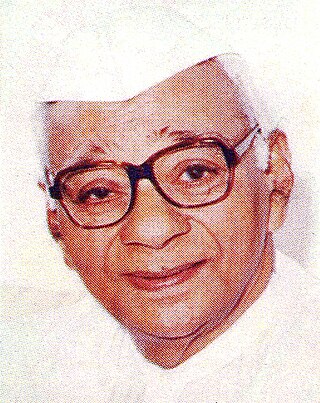
Kasu Brahmananda Reddy was the Chief Minister of Andhra Pradesh, India, from 29 February 1964 to 30 September 1971. On 3 June 1977, he was elected president of the Indian National Congress.

Telugu literature is the body of works written in the Telugu language. It consists of poems, short stories, novels, plays, and song lyrics, among others. There is some indication that Telugu literature dates at least to the middle of the first millennium, the first extant works are from the 11th century when the Mahabharata was first translated to Telugu from Sanskrit by Nannaya. The language has experienced a golden age under the patronage of the Vijayanagara Emperor-Poet Krishnadevaraya.
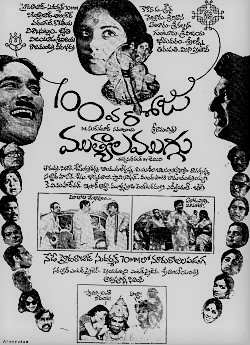
Mutyala Muggu is a 1975 Indian Telugu-language drama film adaptation of Uttara Ramayana from the writer-director duo of Ramana and Bapu. The film stars Sangeeta, Sreedhar, Kanta Rao, Rao Gopal Rao, Mukkamala, Allu Ramalingaiah and Nutan Prasad. The film has garnered two National Film Awards. The film recorded as blockbuster at the box office. Rao Gopal Rao received widespread acclaim for his role. The film was remade in Hindi as Jeevan Jyoti (1976).

The Tank Bund Road is a road in Secunderabad, Hyderabad, India. The Tank Bund dams Hussain Sagar lake on the eastern side and connects the twin cities of Hyderabad and Secunderabad. It has become an attraction with 33 statues of famous people from the region.
Vasireddy Seethadevi was a Telugu writer, bureaucrat of Andhra Pradesh, India.
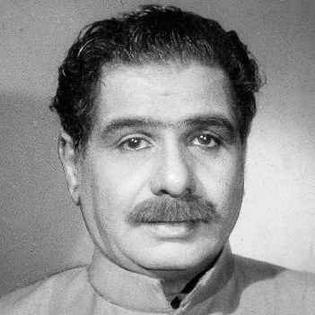
Vuppaladadiyam Nagayya Sarma, popularly known as Chittoor Nagayya, was an Indian actor, singer, music composer, and director known for his works in Telugu cinema, Tamil cinema, and Telugu theatre. Nagayya was one of the first multilingual filmmakers in India. Indian film journalist Baburao Patel described Nagayya as "The Paul Muni of India". Nagayya was considered the best character actor in South Indian cinema during 1940s and 1950s. In 1965, he became the first South Indian actor to receive the Padma Shri in Arts from the Government of India for his contributions to Indian cinema.
Gunturu Seshendra Sarma B.A. B.L., also known as Yuga Kavi, was a Telugu poet, critic and litterateur. He is well known for his works Naa Desam, Naa Prajalu and Kaala Rekha. He authored over fifty works which have been translated into English, Kannada, Urdu, Bengali, Hindi, Nepali and Greek.

T. G. Kamala Devi, also known as Kamala Chandra Babu, was an Indian dubbing artist, playback singer and actor who primarily contributed to Telugu cinema as well as a few Tamil films. She was also a former professional level billiards player who won the Indian Women Billiards title twice. She died of a brief illness at Chennai on 16 August 2012.
Pavuluri Mallana was a c. 11th or early 12th century Indian mathematician from present-day Andhra Pradesh. He translated Gaṇita-sāra-saṅgraha, a 9th century Sanskrit mathematical treatise of Mahaviracharya into Telugu as Sāra Sangraha Ganitamu, popularly known as Pavuluri Ganitamu.
Jandhyala Papayya Sastry was an eminent Telugu writer and lyricist. He was popularly known as Karunasri because his writings expressively show compassion, one of the nine Rasas. His famous kavyas include Pushpa Vilapam and Kunthi Kumari.

The Hans India is an Indian English-language daily newspaper published in the states of Andhra Pradesh and Telangana as well as in New Delhi. The newspaper was started on 15 July 2011 and belongs to Hyderabad Media House Ltd., which also owns Telugu-language news channel HMTV. The chief editor is V. Ramu Sarma.

The culture of Hyderabad, also known as Hyderabadi Tehzeeb or Dakhini Tehzeeb, is the traditional cultural lifestyle of the Hyderabadi Muslims, and characterizes distinct linguistic and cultural traditions of North and South India, which meet and mingle in the city and erstwhile kingdom. This blending was the result of the geographic location of the region and the variety of historical dynasties that ruled the city across different periods—its inception by the Qutub Shahi dynasty in 1591 AD, the occupation by the Mughal Empire and its decline, and the patronage under the Asaf Jahi dynasty.

Ilapavuluri Panduranga Rao was an Indian scholar, poet, writer, linguist and orator of Telugu descent.

Mercy Margaret is a poet, short story writer and a social worker from Hyderabad, India. She came to light as a poet through her poems published in Facebook and became famous after receipt of Kendra Sahitya Akademi Yuva Puraskar Award in the year 2017, for her first poetry book "Matala Madugu" "మాటల మడుగు" in Telugu language
Shaik Khaja Hassan, popularly known by his pen name Devi Priya, was an Indian Telugu-language poet and journalist known for his political satire. He was a recipient of the 2017 Sahitya Akademi Award for his work Gaali Rangu. Some of his famous works included Adhyakshaa Mannichandi, Gareebi Geetaalu, and Amma Chettu Chepa Chiluka.

Ananya Nagalla is an Indian actress who appears in Telugu films. She made her debut in the 2019 film Mallesham and went onto appear in films such as Play Back (2021) and Vakeel Saab (2021). She was nominated for SIIMA Award for Best Female Debut – Telugu.













